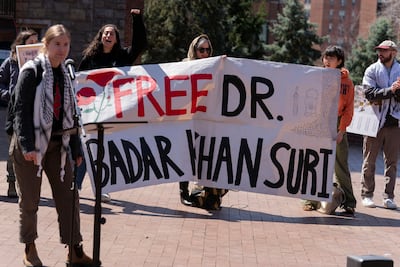The legal team for Badar Khan Suri, a Georgetown University researcher who was detained because of his views on Gaza, is attempting to have his case moved back to Virginia after he was transferred to a detention facility in Texas.
The Department of Homeland Security (DHS) has accused Mr Suri, an Indian citizen studying in the US, of having “close connections to a known or suspected terrorist, who is a senior adviser to Hamas”.
“Conditions are rough,” Mr Suri's lawyer, Hassan Ahmad, told The National in an email. “It's been a challenge getting and scheduling attorney calls, and he spent the Eid holiday in detention as many of the other Muslim students abducted by the administration have done.”
Mr Ahmad said he and others on the legal team filed a motion to transfer the case back to Virginia, where a hearing has been scheduled for April 11. The lawyer also reiterated that the US government has provided no evidence to support its claims leading to Mr Suri's apprehension on March 17 at his Rosslyn, Virginia home.
An assistant to Secretary of State Marco Rubio has said Mr Rubio determined the scholar's activities “rendered him deportable”.

Mr Ahmad said he has been unable to speak to Mr Suri on a secure line, limiting his ability to represent him effectively. “He reiterated that he was grateful for the outpouring of support,” Mr Ahmad said. “Mr Suri was trying to keep his spirits up and he told me he broke fast with four other Muslim detainees he met, but the distance away from his wife and kids and her inability to visit him makes it so much worse.”
According to Mr Ahmad, his client was initially sent to a detention centre in Farmville, Virginia, and then transferred to a prison in Alexandria, Louisiana for several days, before ultimately being moved six hours away to another prison in Prairieland, Texas.
“Despite the federal court order preventing his removal from the US, he is still afraid he may be deported,” Mr Ahmad said last week. “I had to reassure him several times.” Shortly after Mr Suri was detained, Georgetown University in Washington said that it expected the legal system to “adjudicate fairly”.
“We are not aware of him engaging in any illegal activity, and we have not received a reason for his detention,” the university said in a statement. Several days later, Georgetown Dean Joel Hellman issued a lengthier statement, saying that he was deeply concerned about Mr Suri's detention.
“Like many in our community, Dr Suri has been exercising his constitutionally protected rights to express his views on the war in the Middle East. Georgetown has consistently protected such freedoms within the context of our long-standing Speech and Expression Policy,” he said.

Mr Rubio said last week that the State Department had revoked at least 300 visas, many to foreign students, as it cracks down on people who have participated in protests against Israel's war in Gaza. Mr Suri's detention followed a series of arrests by immigration authorities of students involved in pro-Palestine activism, including Mahmoud Khalil, a Columbia University graduate who has been active in protests.
Lawyers from the ACLU of Virginia have also joined Mr Suri's legal team. “The First Amendment protects the right to free speech of everyone in the US, regardless of their immigration status,” said ACLU of Virginia senior supervising attorney Vishal Agraharkar. “Similar to what’s happening to Mahmoud Khalil, Khan Suri’s unlawful arrest and detention represent a frightening escalation in the Trump administration’s efforts to silence speech of which they are critical.”
Shortly after Mr Suri was detained, DHS spokeswoman Tricia McLaughlin claimed in a post on X that Mr Suri was “actively spreading Hamas propaganda and promoting anti-Semitism on social media”.

Politico reported that Mr Suri's legal team alluded in court to the “Palestinian heritage of his wife”, Mapheze Saleh, a US citizen who is listed as a member of Georgetown's class of 2026, as a motive behind the government's detention of him.
“Mapheze, a first-year student from Gaza, earned her bachelor’s degree in journalism and information at the Islamic University of Gaza, Palestine, and a master’s degree in conflict analysis and peace-building from the Nelson Mandela Centre for Peace and Conflict Resolution at Jamia Millia Islamia in New Delhi, India,” reads a biography of Ms Saleh on Georgetown's Centre for Contemporary Arab Studies website.
In February, Israel's embassy in the US posted on X that Ms Saleh was “the daughter of a Hamas senior adviser”. Students at Georgetown University have protested against Mr Suri's detention in recent weeks, demanding his release from prison and a reversal of the government's deportation efforts.
“Our government abducted a man from his wife and children because one person didn't like the fact that he acknowledged the humanity of Palestinians, and that should shock every single American,” Mr Ahmad said. “According to the immigration charging document, his presence in the United States is bad for foreign policy. If this is the guy our government thinks is a problem, then the problem is the government.”
Despite ample criticism and legal challenges, the Trump administration appears to be undeterred in its efforts to increase deportations.

